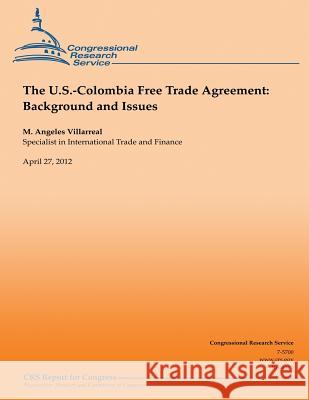The U.S.-Colombia Free Trade Agreement: Background and Issues » książka
The U.S.-Colombia Free Trade Agreement: Background and Issues
ISBN-13: 9781482075977 / Angielski / Miękka / 2013 / 38 str.
The U.S.-Colombia Free Trade Agreement, or U.S. Colombia Trade Promotion Agreement, as it is officially called, is a comprehensive free trade agreement (FTA) between the United States and Colombia, which will eventually eliminate tariffs and other barriers in bilateral trade in goods and services. The agreement will enter into force on May 15, 2012. On October 3, 2011, President Barack Obama submitted draft legislation (H.R. 3078/S. 1641) to both houses of Congress to implement the FTA. On October 12, 2011, the House passed H.R. 3078 (262-167) and sent it to the Senate. The Senate passed the implementing legislation (66-33) on the same day. The agreement was signed by both countries almost five years earlier, on November 22, 2006. The Colombian Congress approved it in June 2007 and again in October 2007, after it was modified to include new provisions agreed to in the May 10, 2007 bipartisan understanding between congressional leadership and President George W. Bush. Upon entry into force, the agreement will immediately eliminate duties on 80% of U.S. exports of consumer and industrial products to Colombia. Most remaining tariffs will be eliminated within 10 years of implementation. The congressional debate surrounding the CFTA mostly centered on violence, labor, and human rights issues in Colombia. Numerous Members of Congress opposed passage of the agreement because of concerns about alleged violence against union members in Colombia, inadequate efforts to bring perpetrators to justice, and weak protection of worker rights. However, other Members of Congress supported the CFTA and took issue with these charges, stating that Colombia had made great progress over the last ten years to curb violence and enhance security. They also argued that U.S. exporters were losing market share of the Colombian market and that the agreement would open the Colombian market for U.S. goods and services. For Colombia, an FTA with the United States is part of its overall economic development strategy. To address the concerns related to labor rights and violence in Colombia, the United States and Colombia agreed upon an "Action Plan Related to Labor Rights" that includes specific and concrete steps, with specific timelines, most of which took place in 2011. It contains numerous commitments by the Colombian government to protect union members, end impunity, and improve worker rights. The Colombian government submitted documents to the United States in time to meet various target dates listed in the Action Plan. The USTR reviewed the documents and determined that Colombia had met its major commitments. The U.S. business community generally supports the FTA with Colombia because it sees it as an opportunity to increase U.S. exports to Colombia. U.S. exporters urged U.S. policymakers to move forward with the agreement, arguing that the United States was losing market share of the Colombian market, especially in agriculture, as Colombia entered into FTAs with other countries. Colombia's FTA with Canada, which was implemented on August 15, 2011, was of particular concern for U.S. agricultural producers. The United States is Colombia's leading trade partner. Colombia accounts for a very small percentage of U.S. trade (1.0% in 2011), ranking 22nd among U.S. export markets and 23rd as a supplier of U.S. imports. Economic studies on the impact of a U.S.-Colombia free trade agreement (FTA) have found that, upon full implementation of an agreement, the impact on the United States would be positive but very small due to the small size of the Colombian economy when compared to that of the United States (about 2.2%).
Zawartość książki może nie spełniać oczekiwań – reklamacje nie obejmują treści, która mogła nie być redakcyjnie ani merytorycznie opracowana.











